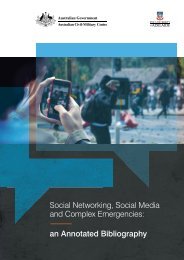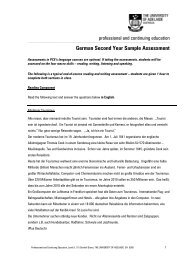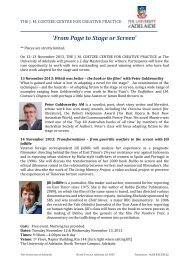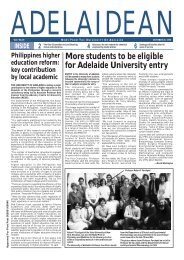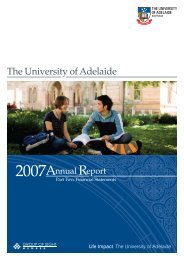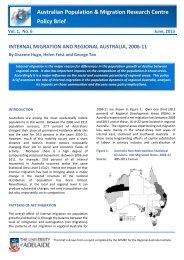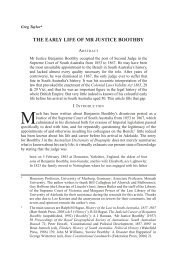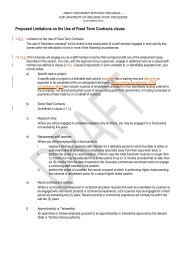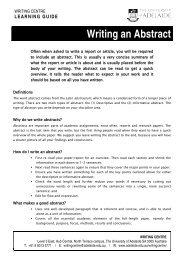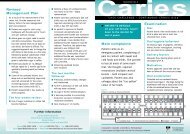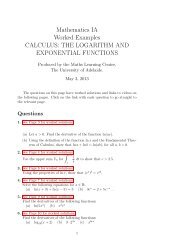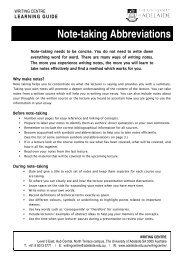Unbridling the Tongues of Women - The University of Adelaide
Unbridling the Tongues of Women - The University of Adelaide
Unbridling the Tongues of Women - The University of Adelaide
Create successful ePaper yourself
Turn your PDF publications into a flip-book with our unique Google optimized e-Paper software.
Prophet <strong>of</strong> <strong>the</strong> effective vote<br />
injustice had been, she wrote later, ‘<strong>the</strong> foremost object <strong>of</strong> my life’. 3 Spence was 66<br />
when she first mounted a platform to explain to South Australians why <strong>the</strong>y should<br />
demand <strong>the</strong> introduction <strong>of</strong> proportional representation. She was 67 when she set<br />
out for <strong>the</strong> United States to teach North Americans how to vote, but ‘this subject is<br />
not with me one <strong>of</strong> to-day or <strong>of</strong> yesterday’ she told a meeting in London in 1894. 4<br />
She dated her interest in electoral methods from her childhood in Scotland,<br />
where her mo<strong>the</strong>r urged <strong>the</strong> benefits <strong>of</strong> <strong>the</strong> Reform Act <strong>of</strong> 1832 in <strong>the</strong> local press. 5<br />
That concern had developed during her early years in South Australia, when <strong>the</strong><br />
municipal council which employed her fa<strong>the</strong>r was elected by quota representation.<br />
<strong>The</strong> provision had been introduced into <strong>the</strong> legislation by Rowland Hill, copying<br />
<strong>the</strong> system that his fa<strong>the</strong>r had devised for electing committees in his school in Tottenham,<br />
6 so Spence’s acquaintance first with Emily Clark, subsequently with Clark’s<br />
uncles and cousins in England, undoubtedly reinforced her interest. <strong>The</strong> <strong>Adelaide</strong><br />
Municipal Council did not use Hill’s electoral system again; <strong>the</strong> South Australian<br />
declared it a ‘novel but very absurd principle’, 7 and, for once, most <strong>of</strong> <strong>the</strong> colonists<br />
must have agreed with <strong>the</strong> paper’s judgment. When Spence sustained a thoroughly<br />
anti-labour, anti-urban argument in favour <strong>of</strong> <strong>the</strong> principle throughout those and<br />
subsequent early electoral campaigns, her arguments found no favour anywhere. 8<br />
She may have shifted her allegiances a little after she had joined <strong>the</strong> Unitarians and<br />
encountered doctrines less elitist than those <strong>of</strong> <strong>the</strong> Shorter Catechism, but <strong>the</strong> chief<br />
factor in changing <strong>the</strong> way in which she regarded manhood suffrage came from her<br />
wide reading. In 1859, she read J. S. Mill’s review, ‘Recent Writers on Reform’, in<br />
Fraser’s Magazine, and that gave her, she wrote later, her ‘strongest political inspiration’.<br />
9<br />
Mill was considering three books about parliamentary reform in England. <strong>The</strong><br />
third was Thomas Hare’s A Treatise on <strong>the</strong> Election <strong>of</strong> Representatives, Parliamentary<br />
and Municipal, which Mill acclaimed as ‘<strong>the</strong> most important work ever written on<br />
<strong>the</strong> practical part <strong>of</strong> <strong>the</strong> Subject’. By developing ‘what is commonly called <strong>the</strong> Representation<br />
<strong>of</strong> Minorities’, wrote Mill, Hare showed opponents <strong>of</strong> ‘purely democratic<br />
suffrage’ how <strong>the</strong>y could accord to ‘<strong>the</strong> most numerous class, that <strong>of</strong> <strong>the</strong> manual<br />
labourers’, <strong>the</strong> majority representation which justice to <strong>the</strong>ir numbers demanded,<br />
without conceding total representation. Hare’s electoral scheme ensured that minorities<br />
would retain a representative voice in <strong>the</strong> legislature. It would also, Mill<br />
considered, ‘prodigiously improve <strong>the</strong> personnel <strong>of</strong> <strong>the</strong> national representative’: ‘An<br />
assembly thus chosen would contain <strong>the</strong> elite <strong>of</strong> <strong>the</strong> nation’. 10<br />
123



